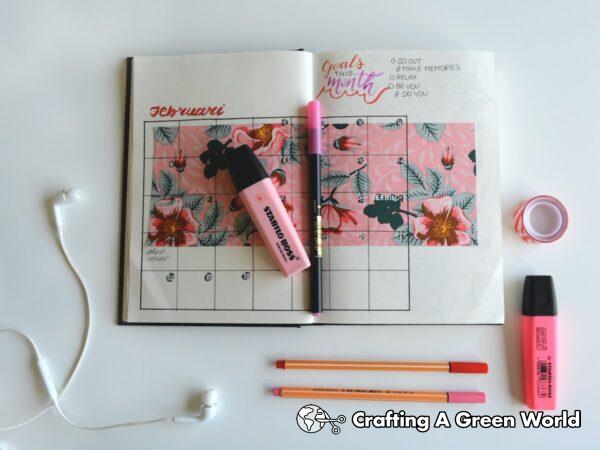Therapy journaling is a powerful tool that offers you a safe space for self-exploration, personal growth, and healing. It encourages introspection, helps in understanding complex feelings, and serves as an inexpensive therapeutic avenue. Whether you’re starting your therapy journaling journey or searching for new ways to excavate substantial thoughts, providing inspiration is our mission.
In this article, we’re excited to share a collection of therapy journal prompts designed to spark self-discovery, acknowledging emotions and charting your mental health progress. It doesn’t matter if you’re a pro or a novice in journaling, these prompts will level up your journaling practice, making it more insightful and beneficial.
So, fetch your favorite journal, a comforting cup of tea, and prepare to traverse the fascinating depths of your mind. Let’s embark on this journey towards emotional clarity and self-understanding together!💖
Mental Health Awareness
Mental Health Awareness is a significant part of personal wellbeing, and reflecting on it through therapy journal prompts can foster understanding, compassion, and resilience. Here are 20 writing prompts related to Mental Health Awareness for your journaling exercise:
- Write about a recent event that made you feel emotionally balanced.
- Reflect on the coping strategies that work best when you're feeling stressed or anxious.
- Describe a recent achievement that made you feel positive and capable.
- List three things you can do to take care of your mental health today.
- Write a letter to your future self offering advice on maintaining good mental health.
- Reflect on an experience that challenged your mental strength. How did you overcome that?
- Identify five things you could do to help a friend struggling with their mental health.
- Write about a worry you have, then list possible solutions or steps you could take to deal with it.
- Describe how you've grown in your understanding of mental health over the years.
- Consider a relaxing activity you haven’t done lately. Describe how you will make time for it this week.
- Reflect on the role self-care plays in your mental wellbeing.
- Write about a time you reached out for help or support. How did it make you feel?
- Identify three things you do regularly that reinforce your sense of self-worth.
- List five affirmations that could help lift your spirits during challenging times.
- Write about a book, quote, or person that inspired you during a time of mental strife.
- Reflect on a habit, hobby, or routine that enhances your mental health. Explain why it works for you.
- Think about a significant loss or hardship you've faced. Describe how it affected your mental health and your healing process.
- Write a letter to a loved one, expressing gratitude for their support in your mental health journey.
- List three lessons you've learned about your mental health in the past year.
- Create a list of mental health resources and support networks you could turn to when needed.
Dealing With Stress
Addressing and unpacking stress through therapy journal prompts can be a cathartic and relieving process, supporting you to better manage and understand your reactions to stressors. Here are 20 journal prompts to aid you in reflecting on and dealing with stress:
- Describe a situation that made you feel stressed today. How did your body react?
- Write about the strategies you already use to handle stress. Are they effective?
- What are the main triggers of your stress? How can you minimise exposure or change your reaction to them?
- Describe a time when you handled stress exceptionally well. What did you do right?
- Craft a letter to stress. What would you like to say to it?
- Visualize your stress as a physical entity. What does it look like? How does it behave?
- List three things you could do to alleviate stress right now.
- Analyze why you think you react the way you do to stressful situations.
- Identify some self-care activities that make you feel relaxed and can counteract stress.
- Recall a stressful scenario from your past. How would you handle it differently now?
- Write about how you feel when you are stressed. Use as much detail as possible.
- Create a stress-reducing mantra or affirmation for yourself and explain why you chose it.
- What are some positives that have come from stressful situations you've experienced?
- Write a dialogue between you and your stress. What does it say? What do you say back?
- Imagine your life without stress. What would be different?
- Ponder three things that could have been stressful today but weren't. Why didn't they stress you?
- Describe a time when stress had a physical impact on you.
- Write a short story where the main character overcomes a stressful situation.
- Design your ideal stress-free day, hour by hour.
- Plan the next steps you’re going to take to cope with stress. How will you implement them?
Gratitude Practice
Practicing gratitude in the realm of therapy journal prompts lets us identify and appreciate the positive aspects of our lives, effectively enhancing our overall happiness and contentment. Here are 20 writing prompts centered around Gratitude Practice:
- Write down three people in your life you are grateful for and why.
- Discuss a significant life event that made you more appreciative of smaller blessings.
- Name three aspects of your surrounding environment you are thankful for.
- Recall a moment this week when you felt a burst of genuine gratitude.
- Discuss a negative experience that resulted in positive outcomes you're grateful for.
- Highlight an attribute or skill you are grateful to possess. How does it add value to your daily life?
- Mention a book or film that has brought positive changes in your thinking.
- List five simple pleasures that bring joy to your everyday life.
- Think about a heartwarming memory from your past that you're thankful for.
- Identify someone who has a positive influence on your life and the reasons why you feel grateful for them.
- Describe a situation in which someone expressed gratitude towards you.
- Write about a recent compliment you received and why it meant so much to you.
- Reflect on a physical feature or ability you are grateful for.
- List five things about your home that make you feel thankful.
- Describe a moment in nature that took your breath away.
- Reflect on a personal challenge you've overcome and what it taught you.
- Discuss a personal quality or accomplishment you are proud of.
- Write about someone who has passed away and how they enriched your life.
- Think about a piece of technology that makes your life easier or more enjoyable.
- Conclude with an open-hearted letter to yourself, celebrating all the things you are grateful for in your life.
Coping With Anxiety
Coping with anxiety through journaling serves as an effective way to unpack and manage our feelings and thoughts, often providing a sense of relief and clarity. Here are 20 prompts aimed to assist you in managing anxiety through your journaling sessions:
- List down five things that are causing you the most anxiety right now.
- Write a letter to your anxiety. What would you like to say to it?
- Describe a situation where your anxiety held you back. How might you handle it differently next time?
- Identify three coping strategies that help reduce your anxiety.
- Imagine a safe, peaceful place. Describe it in great detail.
- Jot down five affirmations that you can repeat to yourself when feeling anxious.
- Reflect upon a time when you successfully navigated an anxiety-inducing situation.
- Visualize, and describe a time in the future when you're in control of your anxiety.
- Think of a person who helps you feel calm and centered. Write about why they make you feel this way.
- Recall a moment when anxiety gave you insight or strength. What did it teach you?
- List five things you can see, four things you can touch, three things you can hear, two things you can smell, and one thing you can taste to ground yourself in the present moment.
- Imagine your anxiety as a storm. Describe the calm after it passes.
- Write about the kind words you would offer a friend experiencing anxiety.
- Identify ten things you're grateful for in your life.
- Jot down five things in your surroundings that could help you relax when you're feeling anxious.
- Write a thank you note to yourself for managing and coping with your anxiety.
- Set some small, achievable goals for the future that can help you manage your anxiety.
- Describe a favorite activity or hobby that helps distract you when anxious.
- Detail a worry you have and then list practical steps you can take to address it.
- Reflect on how your life would be different if you were able to manage your anxiety effectively.
Manifestation Of Goals
Manifesting your goals through journaling aids in actualizing your ambitions and desires in life, giving a written form to your aspirations. Here are 20 prompt ideas to assist you in manifesting your goals through your therapy journal entries:
- Write down a goal you'd like to achieve in the next six months. How would achieving it make you feel?
- Describe in detail what your ideal day would look like if you've already reached your dream goal.
- List down the steps you believe would lead you closer to your goal.
- Imagine it is one year from now and you have achieved your goal. Write a letter congratulating yourself.
- Enlist five people whose success inspires you? What qualities do they possess that you idolize?
- Write down three new skills you might need to acquire to reach your goals.
- What habits could be holding you back from reaching your goals? Write them down and brainstorm ways to change them.
- Think about an obstacle that is slowing you down. How can you overcome it?
- Create a vision board in your journal using words or images that represent your goals.
- If you could have any career without restrictions or limitations, what would it be?
- Narrate a story about how your life would change if you were to achieve your biggest goal.
- Write down a list of reasons why you truly want to achieve your goals.
- Develop an action plan for the following week that centers around taking steps towards one of your goals.
- Chart out a timeline for your goal, with milestones along the way.
- What could be some potential challenges you might face in reaching your goal? How can you prepare for them?
- Write a letter to your future self about the goals you are planning to achieve.
- Journal about a time you achieved a goal you had at first thought was impossible.
- List down the affirmations that will keep you focused and positive as you work towards your goal.
- Who are the people who will support you in the journey towards your goal? Write a thank you note for them.
- Lastly, celebrate your progress. Write down the milestones you've reached, no matter how small they may seem.
Artistic Expression
Artistic expression in therapy journaling allows for the release and structure of emotions in a creative and nurturing way, aiding in personal exploration and growth. Below are 20 prompts to encourage artistic expression in your therapy journaling routine:
- Draw a self-portrait as you see yourself right now. Write a brief description of how it makes you feel.
- Depict a landscape that perfectly reflects your emotion at this moment.
- What color represents your current mood? Draw an abstract image using contrasting shades of this color.
- Sketch your wild imagination's version of a 'safe place' and explain what it represents.
- Draw a mask that represents the face you show to the world. Next, draw a mask that represents your inner self. Compare the two.
- What is a symbol of hope for you? Illustrate it in your journal and describe why it feels hopeful.
- Scribble randomly on the page for a minute. Now, turn the scribbles into a coherent image.
- Sketch out a scene from a memorable dream. Then, write about how it felt.
- Illustrate an imaginary animal that represents your strengths. Write about its traits and how they mirror yours.
- Design a road representing your life's journey. Add significant landmarks and explain why they are important.
- Choose a quote that motivates you. Make an illustrative, creative page around it.
- Sketch an image of a powerful memory. Write about why this memory still has such a hold on you.
- Create a piece of abstract art that represents an emotion you find hard to put into words.
- Draw an object that represents your aspirations. Write about why this object symbolizes your dreams.
- Make a comic strip, even if it's simple stick figures, talking about your day or your feelings.
- What does happiness look like to you? Draw a picture of it.
- Design a unique mandala. Note down how the process and finished project makes you feel.
- Create a collage of images, either drawn or from magazines, that represent your past, present, and future.
- Design a visual map of your personal growth from the past month, past year, or any significant period.
- Draw yourself as a warrior. Write about the battles you are fighting and those you have won.
Understanding Depression
Exploring your understanding of depression through therapeutic journaling can provide insightful revelations, increased self-awareness, and foster personal growth. Here are 20 prompts that can guide you in contemplating depression:
- Describe how your depression physically feels.
- Write about how depression altered your outlook on life.
- Note down the biggest challenges you face due to depression.
- Reflect on any misconceptions you had about depression before you experienced it.
- Describe what you wish others understood about your battle with depression.
- Write about a moment when your depression felt overwhelming and how you handled it.
- List three coping mechanisms that have worked for you.
- Discuss how depression has affected your relationships.
- Write about any stigmatising encounters you've faced because of your condition.
- Journal about how maintaining routines help you manage depression.
- Describe a moment when you felt understood and supported in your journey with depression.
- Reflect on how depression has changed you as a person.
- Write about your experiences with professional help, if applicable.
- Discuss a piece of advice you would give to someone newly diagnosed with depression.
- Write about any positive habits or self-care routines you've adopted to manage depression.
- Describe your hardest day with depression, and how you overcame that day.
- List any fears or anxieties that arise from managing and living with depression.
- Discuss any positive influences or inspirations in your journey with depression.
- Note down how you want to feel and where you want to get in your journey.
- Write a letter of self-compassion and understanding to yourself, highlighting your resilience despite depression.
Anger Management
Utilizing therapy journal prompts for anger management aids in understanding the cause of your anger, and ways to react more calmly in triggered situations. Here are 20 prompts designed for personal exploration and mitigation of anger:
- Identify an event that provoked anger in you. What specifically triggered this emotion?
- Write about a situation where you controlled your anger effectively. What strategy did you use?
- Describe a recent instance when you lost control of your anger. What could you have done differently?
- List three situations in which your anger was completely reasonable.
- Think about a person who triggers your anger. Draft a letter to them expressing your feelings, without sending it.
- Describe how your body responds physically when you're angry. What signals do you observe?
- Write about a time when you regretted reacting poorly due to anger. What did the episode teach you?
- List five calming methods you could employ when you start to feel angry.
- Imagine a calming place or scenario. Describe it in detail with an aim to visualize it when anger strikes.
- Write about a negative internal or external consequence of your uncontrolled anger.
- Document any recurrent patterns in your anger, such as causes, reactions, and coping strategies.
- Draft an anger management plan that encompasses identification, regulation, calm tactics, and retrospective reflection.
- Write about three personal strengths you can leverage to better manage your anger.
- Reflect on how your life could improve if you managed your anger more effectively.
- Identify a positive outcome that was triggered by your anger.
- Visualize yourself in an angering situation, then write about reacting calmly and effectively.
- Write about a situation where you successfully empathized with the person that made you angry.
- List three phrases or affirmations you can repeat to yourself when anger arises.
- Describe a role model who manages their anger well. What qualities do they display?
- Set some realistic goals for managing your anger in the future.
Breathing Relaxation Exercises
Breathing Relaxation Exercises are a powerful tool for self-regulation and mindfulness, creating an ideal subject for therapeutic journaling. With that in mind, here are 20 prompts centered on this topic for your journal:
- Detail the feeling you experience during effective breathing relaxation exercises. What do you physically and emotionally feel?
- Write about a stressful situation and how using breathing relaxation exercises helped to calm your nerves.
- Describe the breathing technique you find the most challenging. Why?
- Recognizing barriers is essential; list three things that distract you from focusing on your breathing exercises.
- Write a step-by-step guide explaining your favourite breathing relaxation exercise.
- Detail any changes you've noticed in stress levels or mental health since incorporating breathing relaxation exercises into your life.
- Write a letter to your future self reminding them to practice breathing exercises during stressful times.
- Note any patterns or trends you've observed in your stress or anxiety levels coinciding with practice or lack of practice of these exercises.
- Describe what physical setting or environment seems to enhance your breathing exercises.
- Write an affirmation for yourself as you start your exercises. What do you wish to manifest or release during this process?
- Describe your mental state before, during, and after performing breathing relaxation exercises.
- List three benefits you've experienced since you incorporated breathing relaxation exercises in your routine.
- Reflect on any difficulties you are facing in establishing a consistent routine of breathing exercises.
- What thoughts or images come to mind when you are performing these exercises?
- Write a thank you letter to your body for its capability to use breath as a source of calm and balance.
- Describe a situation where you unexpectedly used a breathing technique – how did it help?
- Pen down any fears or anxieties you faced when you first began these exercises.
- Draft a persuasive letter encouraging a friend to incorporate breathing exercises into their lives – list the benefits from your personal perspective.
- Project into the future; how do you see these exercises shaping your stress resilience?
- Write about the differences in your sleep patterns, if any, since you started practicing breathing relaxation exercises regularly.
Self-love Affirmations
Practicing self-love affirmations through journaling can foster a better relationship with oneself, boosting self-esteem and encouraging self-care. Here are 20 writing prompts to inspire self-love affirmations in your therapeutic journal:
- List five qualities that you love about yourself.
- Write a letter of appreciation to yourself. What would you thank yourself for?
- Describe a personal achievement that you are proud of.
- Reflect on a time you overcame a personal challenge. How did it make you stronger?
- Craft an affirmation that highlights your capabilities and strengths.
- Write about your happiest memory. What role did you play in creating that experience?
- List three things you would like to improve about yourself and write an affirmation for each.
- Write a letter of forgiveness to yourself. What past mistakes are you ready to let go of?
- Describe a moment when you were your own hero.
- Construct an affirmation that expresses your worthiness of love and respect.
- Imagine your future self. What would he/she say to encourage you in the present moment?
- List three goals you want to achieve and write a positive affirmation for each.
- Reflect on a moment when you felt truly loved and appreciated. How can you recreate that feeling for yourself?
- Craft an affirmation that reminds you that it's okay to put your needs first.
- Describe the kindest thing you've ever done for yourself.
- Write a positive affirmation for each perceived flaw you have.
- Reflect on a compliment you've received that made you feel good about yourself. How can it be translated into an affirmation?
- Craft an affirmation that supports your personal growth and self-development.
- Write about your most important personal values and compose an affirmation that reinforces them.
- Reflect on the qualities that make you unique and write an affirmation that celebrates your individuality.
Processing Grief And Loss
Incorporating the concept of Processing Grief and Loss into your journaling practice can be cathartic, promoting healing and understanding. Here are 20 enticing prompts to guide you through this emotional journey:
- Reflect on your most potent memory of the person or thing you've lost. What makes this particular memory stand out?
- Write a letter to the person or thing you've lost, expressing your internal feelings.
- Journal about the moment you felt the loss most profoundly. What was happening around you, and how did it magnify your grief?
- If you could have one more day with what you lost, what would you do together?
- Consider your personal growth since your loss. In what ways have you changed or evolved?
- List three lessons you've learned from your experience with grief and loss.
- Journal about something your grief has made you grateful for.
- Formulate a conversation with your grief, asking it questions about its purpose or existence.
- Limn a metaphor that illustrates your grief. What does it look like, sound like, feel like?
- Write a future letter to yourself, assessing your feelings about the loss and how you hope they evolve.
- Write about a dream involving your loss. How did it make you feel?
- Describe a moment of joy or comfort that you've experienced since your loss.
- Construct a poem dedicated to the person or thing you've lost.
- Archive your changing feelings about the loss over time.
- Imagine a world where your loss didn't occur. How would this world differ from the one you live in now?
- Scribe about a moment of closure or peace you've felt about your loss.
- Compose a dialog with someone else who's dealing with the same grief. How might you support each other?
- Archive a special tradition or ritual you've created to remember what you've lost.
- Chronicle a fear you have about moving on from your grief and why it scares you.
- Lastly, celebrate your growth and resilience in handling your grief. What are some ways you've coped that make you feel proud?
Conquering Fear
Overcoming fear through journaling can help us confront anxieties, increase self-awareness, and promote emotional healing. Here are 20 writing prompts intended to guide you towards conquering your fears:
- Write about a fear you overcame recently, explaining how you managed your thoughts and emotions.
- Describe the worst-case scenario of your greatest fear. How would you cope with it if it were to happen?
- Reflect on a time your fear held you back from an experience or opportunity. What would you do differently now?
- Imagine facing your fear and come out victorious. Write a short story about this experience.
- Think about a person or role model who inspires courage in you. Write a letter to them expressing your admiration.
- Write a letter from your future self, reassuring your present self about a current fear.
- Identify three ways in which fear has positively influenced your life, pushing you to grow or change.
- Think about a time you misunderstood something and it caused fear. How did you dispel this fear and what did you learn?
- Write a dialogue between your fearful self and your rational self, discussing a fear that feels overwhelming.
- Describe a fear you have in great depth then list five rational arguments against it.
- Reflect on any recurrent fears or nightmares. Write about them as if they were a movie plot, giving them an ending where you conquer them.
- Analyze a fear from your past and how it has changed or evolved over time.
- Write about a situation that still triggers fear in you. List three coping strategies to manage this fear.
- Compose a motivational song or poem that you could recite when in the grip of fear.
- Describe a positive outcome that could result from facing your fears.
- Rewrite a past event where fear got in your way, but this time with a triumphant ending.
- List three fears you want to conquer in the future and your initial steps to overcome them.
- Create a detailed plan on how to confront and wrestle against a current fear.
- Muse on the idea of fear as an illusion. Write about how this perspective can change your reaction.
- Record your inner dialogue when you experience fear and reprogram it with encouraging, supportive self-talk.
Maintaining Positivity
Maintaining positivity through therapy journal prompts creates channels for transforming negative thoughts into uplifting messages and promoting a happier, healthier mindset. Here are 20 prompts to assist you in journaling grounded in positivity:
- Recall your happiest memory. What made it so special?
- Describe three things you appreciate about yourself today.
- Write a thank you letter to someone who brightened up your day recently.
- Jot down five things you are grateful for today and explain why.
- Imagine your ideal day. What would it look like?
- Write a positive affirmation and explain why you chose it.
- List five of your achievements and recognise your role in their accomplishment.
- Write about your favorite positive quote and how it resonates with you.
- Capture a moment today when you felt truly alive and why it was so fulfilling.
- Reflect on a difficult situation that turned out to have a positive outcome.
- Document the biggest lesson you have learned this week and how it's shaped your perspective.
- Write a thank you note to your body, recognizing all that it does for you.
- Weave a tale about your perfect existence 10 years from now.
- List three acts of kindness you could perform for others in the next week.
- Document a moment of joy you experienced today. What sparked this joy?
- What hobby or activity most fulfills you? Why does it have such an effect?
- Consider the bravest thing you've done lately. How has it strengthened you?
- Write about a difficult time when the power of positivity guided you through.
- Craft a set of uplifting mantras to use in moments of doubt.
- List three ways you could spread positivity to those around you today.
Cultivating Patience
Cultivating patience through therapy journal prompts can help us develop a calm and tolerant mindset, enhancing our capacity to deal with stress and improving relationships. Here are 20 writing prompts designed to help you nurture patience in your daily life:
- Write about a situation where you lost your patience recently. What could you have done differently?
- Record a time you demonstrated patience and how it positively affected the outcome.
- Describe a person who epitomizes patience to you. What qualities do they have that you admire?
- Jot down three strategies you can use to manage impatience during a stressful situation.
- Reflect on the most challenging test of your patience you've ever faced. How did you handle it?
- Identify an area in your life where you need to cultivate more patience.
- Imagine a dialogue with your future self, discussing how patience has improved your life.
- List three ways you can practice patience today.
- Recall a time when someone's patience with you made a significant impact on your life.
- Draw a picture of what patience looks like to you.
- Write a letter of gratitude to yourself for the patience you've shown in a specific situation.
- Describe a scenario where impatience has led to regret.
- Craft a mantra or affirmation to repeat to yourself in moments of impatience.
- Write about how you feel when you are patient. What physical and emotional sensations do you notice?
- Consider an upcoming event or situation which may test your patience. Plan how you will manage it.
- Reflect on how cultivating patience can improve your relationships with others.
- List 5 things in your life worth waiting for and why they require patience.
- Recall a situation where your patience paid off.
- Write a poem about the journey of developing patience.
- Create a reward system to acknowledge when you’ve successfully exercised patience.
Improving Focus And Concentration
Harnessing the power of therapy journal prompts can aid in improving focus and concentration, paving the way for enhanced mindfulness and mental clarity. Here are 20 journal prompts specifically cultivated to boost your focus and concentration:
- Detail a specific goal you want to focus on this week. How do you plan to stay committed to this task?
- Discuss a recent time when you struggled with concentration. What were the distractions?
- Write a letter to yourself outlining the benefits of maintaining focused and undivided attention to tasks at hand.
- Brainstorm mental exercises that could help increase your focus like meditation or brain games.
- Reflect on your most productive day this past week. What do you believe contributed to this success?
- Write about the physical space where you feel the most focused. Why does this space enhance your concentration?
- Identify three habits you could develop to improve your concentration.
- Discuss a project or task where your focus was optimal. What elements contributed to this focused state?
- Describe a moment when you felt completely immersed (in a state of 'flow') in an activity. How can you replicate this state more often?
- Create a list of potential distractions in your environment. Next, outline steps you could take to remove these distractions.
- How would improving your focus and concentration influence your daily life?
- Write down the longest duration you can maintain focused attention without distraction. What can you do to improve this time?
- Explore an activity you enjoy that requires your full concentration. Why does this activity require all your focus?
- Meditate for five minutes. Afterward, jot down your experiences and any difficulties you encountered.
- Write about the role of rest and relaxation in improving focus and concentration.
- Plan a 'focus' day, from dawn to dusk. What steps will you take to ensure minimum distractions?
- Reflect on how multitasking affects your focus and concentration. Propose a plan to shift to single-tasking.
- Discuss any fears or anxieties that are hindering your focus and concentration. How can you address them?
- Write a commitment to yourself about improving your focus and concentration going forward.
- At the end of the day, note down moments when your focus was at its peak. Also, note when it was lacking.
Nurturing Relationships
Delving into the theme of Nurturing Relationships through therapy journal prompts helps to build and strengthen bonds, enhance emotional intelligence, and promotes mutual respect and understanding. Here are 20 prompts that can guide your exploration of nurturing your relationships:
- Write about a strong, nurturing relationship in your life. What makes that relationship strong?
- Recall a situation where you wished you nurtured a relationship better. How would you improve it?
- Describe an instance when you felt truly nurtured by someone. How did their actions contribute to your feelings?
- Construct a list of five ways in which you can positively nurture your relationship with yourself.
- Ponder upon a challenging relationship. Write a dialogue that clarifies your feelings towards them.
- Write a heartfelt letter to a loved one expressing your desire to nurture the relationship.
- Imagine the perfect nurturing relationship. What are its key components?
- Contemplate and note down a few actions that could harm your relationships.
- Reflect on a time you'd successfully mended a broken relationship. What did you learn from it?
- Write about the role of patience in nurturing relationships.
- How could you consciously work towards nurturing your relationship with a colleague?
- Think about a relationship that you have nurtured over time. How has it evolved?
- Enumerate three actions you can take today to nurture an important relationship in your life.
- Write a letter to yourself, from the perspective of a loved one, appreciating your nurturing qualities.
- Reflect on a time when a simple gesture greatly nurtured a relationship.
- Describe the role of honesty and openness in nurturing your relationships.
- Think about a relationship that is new in your life. How can you nurture it for growth?
- Reflect on how forgiveness has played (or could play) a role in nurturing your relationships.
- Write about your most cherished moments that helped nurture a relationship.
- Contemplate on how understanding other's perspectives can enhance and nurture your relationships.
Building Confidence
Cultivating confidence through therapy journaling can be a transformative practice, which helps to foster a more positive self-image and overall sense of self-worth. Here are 20 therapy journal prompts to assist you on your journey to building confidence:
- Write about a moment you felt most confident. What factors contributed to this?
- Describe an achievement you are proud of and why it means so much to you.
- Write a letter to your future self, detailing the confidence you hope to have.
- List three positive affirmations that boost your confidence.
- Reflect on a time when lack of confidence held you back. How would you handle the situation differently now?
- What are five things you like most about yourself?
- Write about a time when you overcame a challenge. How did it make you feel?
- Identify three things you do well and expand on why.
- Describe an important goal you have for yourself, and the steps you will take to achieve it.
- Reflect on advice you would give to someone struggling with confidence.
- Write about a role model who exemplifies confidence. What qualities do they possess that you admire?
- List three things that scare you and how you plan to confront these fears.
- Write about a time when you felt confident and something didn't go as planned. How did you handle it?
- List the compliments you've received recently and reflect on how they make you feel.
- Write down ten things you are grateful for and why.
- Identify a recent failure and explore what lesson you learned from it.
- Write a pep talk to yourself for days when your confidence is low.
- Describe a decision you made recently that you feel good about.
- Identify three personal triumphs, big or small, from the past week.
- Write about what confidence means to you and why it is important.
Exploring Personal Values
Exploring personal values through therapy journaling can lead us to deep introspective insights about ourselves, the principles we hold dear and how these values influence our daily decisions. Here are 20 prompts to assist you in delving into your personal values:
- Write about a principle that you consider non-negotiable in your life.
- Reflect on an event where you compromised on your values. How did it make you feel?
- Describe a value you've discovered that you did not know you had.
- List three of your top values and how you exercise them in your day-to-day life.
- Write about a person you admire. What values do you appreciate in them?
- Recall a time when your values helped guide you through a difficult decision.
- Describe a value you hold that is different from the beliefs of your family or friends.
- Identify a value you would like to cultivate further and explain why.
- Jot down instances in the past week where you upheld your personal values.
- Write about a time when acting in line with your values brought you joy or satisfaction.
- Reflect on values that you have learned from a mentor.
- Write about a negative experience that taught you something important about your values.
- List two values that sometimes conflict in your life and describe how you navigate these situations.
- Identify a value that has changed over time and discuss why this change occurred.
- Describe how your cultural background has influenced your values.
- List three personal values you want to pass on to upcoming generations and explain why.
- Write about a moment when your values were challenged, and you remained strong.
- Identify a value that you think is often misunderstood or misrepresented.
- Reflect on the interplay between your beliefs, values and actions.
- Describe how acknowledging and understanding your values has affected your personal growth.
Resilience Building Prompts
Resilience Building Prompts are integral tools in therapy journaling to bolster mental fortitude and emotional resilience, helping individuals bounce back from difficulties more readily. Here are 20 resilience-building prompts to get you started on your therapeutic journaling journey:
- Narrate a challenging event you overcame and how it made you stronger.
- List down five strengths that helped you survive tough times.
- Identify a situation in which you displayed resilience. How did it benefit you?
- Visualize your response to future adversities and how you can leverage your resilience.
- Record your thoughts, fears, and hopes in the face of a current challenge.
- Identify aspects about yourself that have changed positively after facing adversity.
- Describe a role model who embodied resilience. What characteristics did they display?
- Dwell on an instance where a setback led to unexpected growth or opportunities.
- Name three coping strategies that help you during hardship.
- Reflect on a time when you felt defeated but didn't give up.
- Envision your life five years from now. How would you use your resilience to overcome future hurdles?
- Write a letter to your past self describing how resilience has shaped your current self.
- Explain how resilience plays a role in your daily life.
- Describe how perseverance has applied to your personal or professional life.
- Chronicle a time when you doubted your ability to overcome a challenge but ultimately persevered.
- What is a current challenge you’re facing and how can you confront it with resilience?
- Recall an instance where bouncing back from failure led you to success.
- Imagine a worst-case scenario and outline your resilient response to it.
- List three personal traits that reinforce your resilience.
- Write a personal mantra or quote that reinforces your resilient spirit.
Healing Trauma
Through journaling, we can consciously engage in the process of healing trauma, by exploring, understanding and gradually making peace with our past. Here are 20 therapeutic prompts to support your journey towards trauma recovery:
- Detail an old memory that causes you discomfort. How do you react to it now?
- Pen down five ways in which you've grown since the traumatic event.
- Write a letter to your past self. What reassurances would you offer?
- Envision yourself in a safe space. Describe this sanctuary.
- Focus on a moment of resilience during your trauma. What strength did you display?
- Explore your feelings about the trauma without judgement or analysis.
- Write about an activity that helps you feel at peace. How can you incorporate it into your daily life?
- Name three weaknesses that emerged from your trauma. Then, name three strengths.
- Imagine your life a year from now, free from this trauma. What does it look like?
- List five self-care practices that make you feel uplifted and attempt to do one each day.
- Detail a difficult conversation related to your trauma you wish you could have. What would you say?
- Write about your relationship with trust following the traumatic event.
- Imagine a dialogue with your trauma. What questions would you ask it?
- Write about your support network. Who are the people that uplift you?
- Describe a moment where you felt in control despite your past trauma.
- Make a list of hobbies or passions you had before the trauma. Have they changed?
- Note down how you feel about forgiveness in relation to your trauma.
- Create a letter to the trauma itself, expressing any feelings, thoughts, and questions.
- Identify five small victories you've achieved in the process of healing.
- Write your future self a letter. How would you like to see your healing progress?
Coping With Change
Embracing change through therapeutic journaling allows us to adapt to new conditions and circumstances, which often leads to personal growth and development. Here are 20 prompts that may help you navigate and make sense of changes in your life:
- Describe a major life change you've experienced. How did you feel at the time?
- Recall a change you initially resisted, but came to appreciate over time.
- Write about a time when you confronted change head-on. What actions did you take?
- Chronicle the steps you've taken to adapt to a new situation.
- Record a situation where you were blindsided by change. How did you handle it?
- Script a conversation with your future self, discussing how you've grown from a specific change or event.
- List three things you've gained from a significant change in your life.
- Think of a change you're currently going through. What measures are you taking to cope?
- Write about a time where change led you to discover a new passion or interest.
- Delve into the uncertainties you feel about a current or upcoming change.
- Contemplate on a change you actively sought out. Why did you want this change?
- Document your feelings when faced with a sudden, unexpected change.
- Reflect on a past event where you felt resistant or fearful of change. How did you overcome it?
- Describe a situation where a positive change led to an unexpected challenge.
- Write about a small change that had a big impact on your life.
- List unexpected benefits you have encountered through facing change.
- Explore a change where you had to say goodbye. How did you cope with the loss?
- Map out the potential impact of a future change you are contemplating.
- Write a letter to change itself – expressing your fears, hopes, and expectations.
- Reflect on how adapting to change has influenced your personal growth.
Fostering Forgiveness
Fostering forgiveness through journaling supports emotional growth and helps in letting go of past resentments, benefiting our mental health. Below are 20 prompts that will guide you in nurturing forgiveness through your writing practice:
- Identify an old grudge you're holding onto. Why have you held onto it for so long?
- Consider someone who has hurt you in the past. Write a letter to them expressing your feelings, but don't send it.
- Reflect on a time when you forgave someone. How did it make you feel?
- Write about an instance where you found it hard to forgive yourself. What steps could you take towards self-forgiveness?
- What would your life look like without the burden of past resentments?
- Imagine you could talk to the person who hurt you without any judgement. What would you say?
- Write an honest letter to yourself about something you need to forgive yourself for.
- Think about someone who wronged you. How could you view their actions from a place of understanding?
- Reflect on the benefits of forgiveness. How could these benefit your life?
- Write about a small thing that annoyed you today. How can you let this go?
- Imagine you have forgiven all your past hurts. How would your future look different?
- Consider someone who has not forgiven you. Write a letter (without sending) asking for their forgiveness.
- How can you practise empathy towards someone who hurt you?
- Write about a time when someone forgave you. How did this make you feel?
- Think of an instance where forgiving someone might benefit them. How?
- Remember a time when withholding forgiveness held you back. In what way did it limit you?
- Recall an incident where forgiving someone improved your relationship with them. Describe it.
- Visualise meeting your past self. What advice would you give them about the power of forgiveness?
- Write about the link between forgiveness and inner peace.
- Reflect on the most significant act of forgiveness you've ever experienced. How has it shaped who you are today?
Unpacking Guilt
Unpacking guilt through therapy journaling can allow for a deeper understanding of self-condemnation, enabling us to learn and grow from our past mistakes rather than be mired in regret. The following 20 prompts can assist in this exploration of personal guilt:
- Write about a recent experience where you felt guilty. Why did you feel this way?
- How has the feeling of guilt affected your actions or decisions?
- Recall a time when you felt guilty for something out of your control. Was this fair to yourself?
- List three ways you can forgive yourself for past mistakes.
- Think about an instance when you took responsibility for someone else's mistake. How would you handle it differently now?
- Describe an event from your past that still triggers guilt. How can you reinterpret it in a more positive light?
- Craft a letter to your past self letting go of the guilt you've been holding on to.
- Write about an apology that you haven’t given yet. What’s holding you back?
- Reflect on a time when guilt led to positive change in your life.
- Can you think of an instance where you felt guilty without reason? How can you avoid such self-inflicted guilt in the future?
- Write about any guilt you may feel over successes or accomplishments. Why do you think you feel this way?
- Define guilt in your own terms. Is it always a negative emotion?
- Write a letter to guilt. How has it shaped your personal growth?
- Reflect on a time when guilt kept you from pursuing something. How might things have gone differently if you'd let the guilt go?
- Describe a situation where you recognized guilt was unnecessary. Did this realization change your behavior?
- Probe into the roots of your guilt. How might your upbringing or societal norms contribute to it?
- Create a plan to address feelings of guilt that plague you. What steps will you take?
- Write an encouraging letter to yourself for a time when you might feel overwhelmed by guilt.
- Reflect on the difference between guilt and regret. How do you understand these two emotions?
- Write about what your life would look like if you released all your guilt. How would this impact your relationships, work, or general state of being?
Self-care Routine Reflection
Practicing Self-Care Routine Reflection through journaling prompts aids in understanding and improving our own habits, leading to an enhanced sense of wellbeing and personal care. Here are 20 prompts to assist you in evaluating your self-care routine:
- Describe your current morning routine. What elements of self-care does it include?
- Write about an area in your daily routine where you feel self-care is lacking.
- List three habits in your routine that promote self-love and why you value them.
- Examine a self-care practice that you'd like to introduce to your routine.
- How does your current night routine support your personal self-care?
- Have you noticed any improvements in your well-being since implementing a self-care routine?
- Reflect on a time when you neglected your self-care routine. What impact did it have on your mood and productivity?
- Write about a self-care routine that didn't work for you. Why do you think it wasn't effective?
- List three ways you can enhance your self-care routine during stressful periods.
- Think about someone whose self-care routine you admire. What aspects of their routine would you like to implement?
- Discuss any obstacles that prevent you from following a consistent self-care routine.
- How do you ensure you make time for self-care within your bustling schedule?
- Write about the role physical activity plays in your self-care routine.
- Think about the relationship between your self-care routine and your overall mental health.
- Discuss the importance of balance in self-care and how your routine reflects this.
- How has your self-care routine evolved over time?
- Describe how your self-care routine assists in managing stress.
- What elements of your self-care routine bring you the most joy?
- Reflect on the first time you intentionally focused on self-care. How has your perception of self-care transformed since then?
- Draft a new self-care routine that you would like to adhere to over the next month.
Emotional Release Techniques
Emotional Release Techniques enable us to piece through and alleviate emotional burdens through expressive writing. Here are 20 stimulating prompts associated with Emotional Release Techniques:
- Write about a time when you let yourself feel a strong emotion without trying to suppress it.
- List out things that you wish you could say to someone who has hurt you, without any judgment or fear of consequence.
- Journal a letter of forgiveness to yourself for past mistakes or regrets.
- Scribble down the emotions you're feeling right now, without filtering them. What prompted these feelings?
- Something that made you angry recently and how you reacted to it.
- Try to remember a time when you bottled up your feelings, write about the actual thoughts you suppressed.
- Recall a moment when you were genuinely happy. What factors contributed to that happiness?
- Write a letter to your younger self. What advice or reassurances would you give?
- Reflect on your most profound fear. What makes it so scary?
- List down five things you wish to let go of, emotionally.
- Identify a situation that feels unfair to you. How would you handle it differently now?
- Chronicle a loving message to the parts of you that feel bruised emotionally.
- Narrate a dream that has stuck with you. What feelings do you associate with that dream?
- Discuss an emotional wound that has shaped the person you are today.
- Write about how you typically react to stress and whether it’s a positive or negative reaction.
- Review a moment you felt truly loved and valued. How can you carry that feeling into your day today?
- Reflect on how your day today would look if you did not hold any negative emotions.
- Think about a personal trait or habit you're not fond of. Write a scenario exploring its positive side.
- Recall the most anxiety-ridden period in your life. Reflect on how you made it through those stressful times.
- Ponder on a situation where you wished you expressed your feelings more. How would it have changed the outcome?











